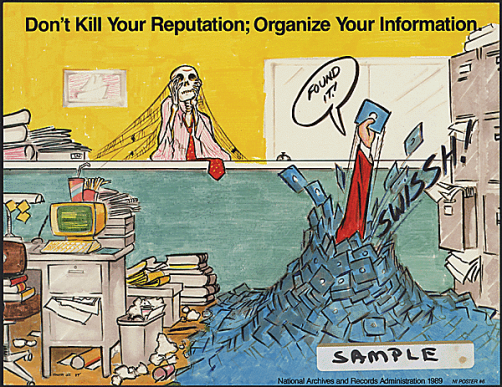Writing in Tuesday’s Wall Street Journal, Melinda Beck quotes Kit Anderson, past president of the Institute for Challenging Disorganization (check out their website! www.nsgcd.org): “Digital clutter doesn’t beget mice or interfere with walking around the house. But it’s more insidious because no one else is going to insist that you get help.”
It is an article which struck a chord with me as we encourage staff here at the National Archives to take a look at the digital files they are maintaining. But it is a message for non-work digital clutter also.
“Hoarding is officially considered a form of obsessive-compulsive disorder, but some hoarders also suffer from attention-deficit-hyperactive disorder. Some digital hoarders are driven perfectionists who don’t know when to stop researching or collecting.” Ouch!

Some tips offered in the article:
- Practice ‘zero email.’ Clear your inbox every day.
- Declare ‘email bankruptcy.’ Delete every unread message and alert your 10 best friends and colleagues to resend crucial messages. NARA staff—not advised!
- Unsubscribe to every newsletter and mailing list not needed.
- Make use of your spam filter
Beck also reports that people typically use only about 20% of what they save. So…how are you doing? Where on the digital hoarding scale do you fall?

David,
Great blog! Can we have a guest speaker in to discuss ways of better managing our e-mails and other work files to help declutter our digital files. I think it would also be benefitial to have a speaker come in to discuss ways of decluttering in general. I think many of us at NARA our pack rats (not full blown hoarders like the TV show) but we could benefit from ideas on keeping our work areas a little less cluttered- I include myself in this so I am not picking on anyone. Or you could blog about how you manage to keep your desk so clean – and clear of clutter.
Combined with the ability to search your e-mail archive, I would argue that digital hoarding may actually be an asset in an age of cheap storage. My Gmail inbox currently has over 3,500 e-mail conversations, yet it’s only 9% full. I probably search my inbox two or three times a week looking for information of one sort or another.
I’m sure this kind of clutter is abhorrent to some people, but I wouldn’t say it “slows down your brain.” On the contrary, it provides quick access to information and cuts down on the need for redundant e-mail conversations. When it comes to e-mail, at least, I’m a proud digital hoarder.